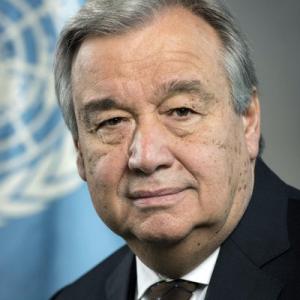Mr. President of the General Assembly, Excellencies, ladies and gentlemen,
Eight years ago, Member States gathered in this Hall to adopt the Sustainable Development Goals.
With the world watching — including 193 young people in the balcony holding blue lamps of hope — you made a solemn promise.
A promise to build a world of health, progress and opportunity for all.
A promise to leave no one behind.
And a promise to pay for it.
This was not a promise made to one another as diplomats from the comfort of this chamber.
It was — always — a promise to people.
People crushed under the grinding wheels of poverty.
People starving in a world of plenty.
Children denied a seat in a classroom.
Families fleeing conflicts, seeking a better life.
Parents watching helplessly as their children die of preventable disease.
People losing hope because they can’t find a job — or a safety net when they need it.
Entire communities literally on devastation’s doorstep because of changing climate.
So, the SDGs aren’t just a list of goals.
They carry the hopes, dreams, rights and expectations of people everywhere.
And they provide the surest path to living up to our obligations under the Universal Declaration of Human Rights, now in its 75th year.
Yet today, only 15 percent of the targets are on track and many are going in reverse.
Instead of leaving no one behind, we risk leaving the SDGs behind.
So, Excellencies, the SDGs need a global rescue plan.
I am deeply encouraged by the detailed and wide-ranging draft political declaration under discussion here today — especially its commitment to improving developing countries’ access to the fuel required for SDG progress: finance.
This includes clear support for an SDG Stimulus of at least $500 billion a year, as well as an effective debt-relief mechanism that supports payment suspensions, longer lending terms, and lower rates.
It includes a call to re-capitalize and change the business model of Multilateral Development Banks so they can massively leverage private finance at affordable rates to benefit developing countries.
And it includes the endorsement of the need to reform the international financial architecture that I consider outdated, dysfunctional and unfair.
This can be a game-changer in accelerating SDG progress.
I have been calling for a new Bretton Woods moment, and the development of practical solutions by the Summit of the Future next September.
But countries can act right now to get the SDGs on track.
Together with businesses and financial institutions, local authorities, the UN development system and more, you have helped point the way with high-impact initiatives to support six targeted areas where urgent transitions are needed.
First — we must take action on hunger.
In our world of plenty, hunger is a shocking stain on humanity, and an epic human rights violation.
It is an indictment of every one of us that millions of people are starving in this day and age.
Building on July’s Food Systems Summit Stocktake, we are marshalling finance, science, data, innovations, and policy and governance support to help countries transform food systems so all people can access a healthy and nutritious diet.
Second — the transition to renewable energy isn’t happening fast enough.
We are putting forward new Energy Compacts in which governments, businesses and global organizations join forces to invest in decarbonizing energy systems, and ensuring a just and equitable transition from fossil fuels to renewable energy.
Third — the benefits and opportunities of digitalization are not being spread widely enough.
To close the divide, we have launched an initiative to spur digital transformation across 100 countries, supporting stronger technology capacities, better governance, and innovative financing.
Our proposed Global Digital Compact will also help countries build safe digital systems that provide internet access for all — including for students in hard-to-reach communities.
Fourth — too many children and young people are victims of poor quality education, or no education at all.
We need to build true “learning societies” anchored in quality education — including lifelong learning from the earliest years to adulthood — closing the digital divide, and supporting teachers every step of the way.
An emerging group of “frontrunner countries” is leading the way in boosting investment and transforming education systems around the world.
Fifth — people need decent work and social protection.
Working with governments and the private sector, our Global Accelerator on Jobs and Social Protection for Just Transitions aims to create 400 million new decent jobs — especially in the green, care and digital economies — and extend social protection to over four billion people. Investments in social protection should be massively increased.
And sixth — the war on nature must stop.
We must end the triple planetary crisis of climate change, pollution and biodiversity loss.
We’re building a group of champion countries to explore how to reform economic policies, and put nature and biodiversity at the heart of all decision-making.
Cutting across all of these transitions is the need to ensure full gender equality.
It’s long past time to end discrimination, ensure a place at every table for women and girls, and the end the scourge of gender-based violence.
Excellencies,
At the halfway point to the SDG deadline, the eyes of the world are on you once again.
Over the course of the weekend, young people and civil society groups came to the UN — or marched in communities around the world — demanding urgent action.
Now is the time to prove you are listening.
We can prevail.
If we act now.
If we act together.
If we keep our promise to the billions of people whose hopes, dreams and futures you hold in your hands.
Now is the time.














